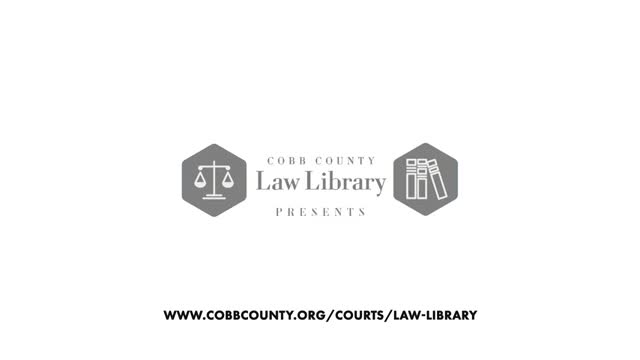Cobb Legal Aid explains Georgia Equitable Caregiver Act and alternatives for relatives and caregivers
Get AI-powered insights, summaries, and transcripts
Subscribe
Summary
Charmaine Anwar of Cobb Legal Aid outlined how Georgia's Equitable Caregiver Act lets third parties seek custody or visitation without terminating parental rights, the standards courts use, and alternative legal options including grandparent visitation, standby guardianship, temporary guardianship and dependency actions.
Charmaine Anwar, an attorney with Cobb Legal Aid, told attendees at the Cobb Superior Court Law Library that Georgia’s Equitable Caregiver Act lets third parties seek custody or visitation without terminating a biological parent’s rights.
The statute, passed in 2019, creates a procedure under which a person who has acted in a parental role can petition the court for “equitable caregiver” standing; the petitioner must meet a clear-and-convincing evidentiary standard and file an initial pleading and affidavit setting out facts that support the parental-like relationship, Anwar said.
Anwar said the law is aimed at providing stability for children who have lived with nonparents in a consistent, parental-like role. “The equitable caregiver act essentially allows third parties to establish custody and visitation without terminating parental rights,” she said.
To obtain standing under the law, the presenter said a petitioner must show a permanent, unequivocal, committed and responsible parental role; consistent caretaking; an independent bonded relationship with the child that was fostered or accepted by a parent; acceptance of parental responsibilities without expectation of payment; and evidence that the child would suffer physical or long-term emotional harm if the relationship were not maintained. Anwar described that showing the strength and duration of the relationship and whether the child has unique medical or psychological needs are parts of the court’s harm analysis.
Anwar explained that if a biological parent consents in writing, the caregiver petition is easier to grant. She also said the statute does not terminate parental rights if equitable caregiver status is granted and noted a categorical bar to original caregiver actions while the Division of Family and Children Services (DFCS) has an open child-welfare case involving the child.
The presentation summarized alternatives the public should consider: grandparent visitation under OCGA 19-7-3, which allows visitation if a court finds a child would be harmed without it and that visitation is in the child’s best interest; standby guardianship, typically used for short-term emergencies and filed in probate court and terminating automatically after 120 days; temporary guardianship, which requires filing in probate in the county where the child resides and requires the petitioner to have physical custody at filing; and dependency actions when parents are unable or unwilling to care for a child and return to parental care depends on parental rehabilitation.
Anwar also gave practical information about Cobb Legal Aid services: free, 30-minute consultations in the law library are available Monday through Wednesday from 9 a.m. to 4 p.m.; intake and screening by phone are available 9 a.m. to noon Monday through Thursday; and nonurgent issues may be submitted through online intake. “If you would like specific legal advice, please consult with an attorney for your individual case,” she said.
The presentation was a procedural overview rather than a workshop on filing a petition; Anwar repeatedly cautioned the talk was general information about Georgia law and may not apply to an individual’s facts. She encouraged people who believe they may qualify to contact Cobb Legal Aid for intake and a potential consultation.
